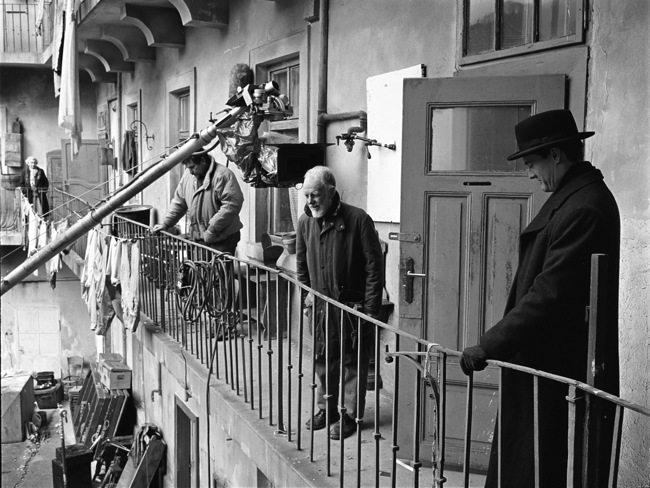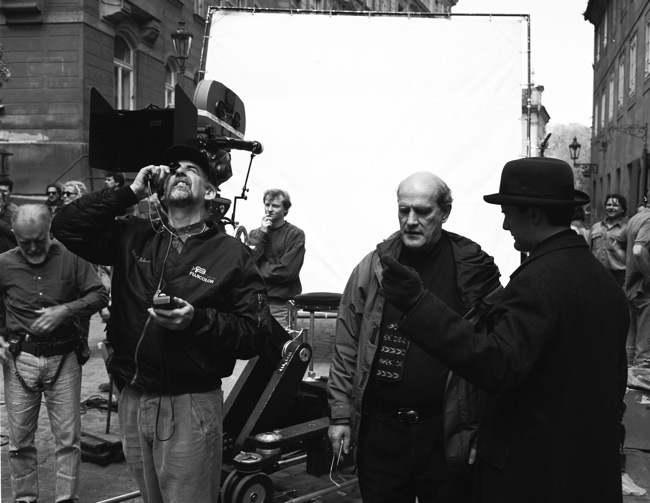A Galaxy of Stars |
 I don't have any pictures of Hopkins on the film. Here's one of Kyle (on right) when we were out and about in Prague - we also spent time in Barrandov Studios, and at Kutna Hora, a half-cathedral a little way out of town. That's a Louma Crane and 1s AD Jake Wright, who flew Spitfires for the Navy at the end of the war - and famously had to ditch when he undershot on a carrier landing. 'One moment I can see everyone scattering from the viewing area on the back of the carrier,' he said, 'and the next I'm in the water being picked up. Can't remember getting out.' Anthony Hopkins et al Anthony Hopkins was fresh from his success on The Silence of the Lambs when he joined us in Prague in 1993 for The Trial, directed by David Jones, (The Shakespearean director, not the Monkee). It was a BBC co-production, so most of the crew were BBC as their part of the budget. The camera crew were all freelance headed by Phil Meheux, who invited me to join as I had worked on 1990's Highlander 2. Despite a script by Harold Pinter and a stellar cast, locations and cinematography, it didn't do very well at the box office and was trashed by critics, one of whom (unfairly) compared it as 'dull as motorway construction'. It was enjoyable, though - I took my unicycle and during my days off unicycled around Prague - most notably across the Charles Bridge. Kyle Maclachlan, more notable for his part in Dune and as Portlandia's Mayor, was a good fit for the part, and liked to horse around on set. On one occasion he had space dust (a popping candy dust that crackles) in his mouth while he ran a rehearsal, having the sound people wondering where the crackle was coming from. He liked to josh around off set too, and thought that he was invulnerable to payback - until Bob picked him up outside the hotel, dumped him in the boot of a taxi, slammed the bootlid and yelled 'Airport!'  Out and about on location in Prague, 1993. L-R: Jake Wright, Phil Meheux, David Jones, Kyle Maclachlan. Phil is timing the turnover so we are either in sun or out of sun for continuity - he's staring at the sky through a dark pan glass, useful on set to gauge contrast levels, and here, to watch the clouds. The big white thing behind is a massive reflector.
Juliet Stephenson was also on the cast, cool and focussed, David Thewlis being, well, David Thewlis. Alfred Molina was always larger than life, Michael Kitchen was as mentioned in a previous GofS. We also have Jason Robards, who came in for a couple of days to Play Huld, the part that Orson Welles played in the 1962 version. Robards was a hugely genial person, and when he found that I had, apparently, the same name as one of his grandchildren (?) was happy to chat to me about, well, anything. He performed his four pages of technically complex dialogue in bed, and rattled through the lines as if he'd spent the last four weeks studying them - when he had actually just learnt them on the plane over. He did it in a single take, too, of about five minutes and word perfect - then, when David gave him notes, he just did it again but subtly different, as required. 'How was that?' he asked me as the grown-ups reviewed the take. I told him I thought it was very good (it was) and he replied: 'Four pages of dialogue - didn't understand a word! Did the horse get out of the stable?' No, I told him, the horse did not get out of the stable. He had been worried that the bed clothes he was dressed in might have, at one point, revealed something they weren't meant to. Hopkins loved to entertain the troops, and did a Tommy Cooper impression that was actually pretty good, as well as a series of jokes that kept us all amused. He liked the laughter, liked to be popular. His role was of the priest, and in a nod to Hannibal Lecter, which we kind of forget these days was a massive hit for him, had a bit of eyeshadow and then stared fixedly at a point in space. During a close-up he asked if I had any chalk - which I supplied - and he made a small cross in the corner of the camera's mattebox (It's the sun shade that goes around the lens) so he could fixate on the spot and deliver his lines in a soft, Lectarian drawl. It was the first time I had ever been asked to take industrial action on a set, too. The BBC branch of BECTU were quite active, and since they were all permanent employees, a lot easier for them to do. They asked us non BBC BECTU bunch to join in for solidarity which was a nonsense as BBC BECTU were notoriously unwilling to ever support the freelance shop. It was doubly nonsensical as they were protesting against the employment of freelancers within BBC productions: I would have been striking against my own employment. As it turned out we worked late one evening and did a late call for a half day the day of the strike - so everyone was happy. Recalled June 25th, 2020. |